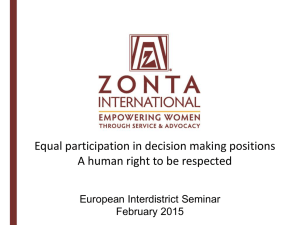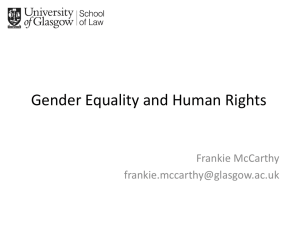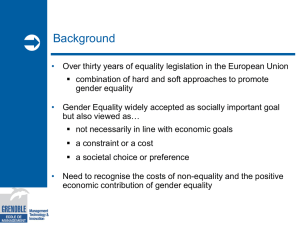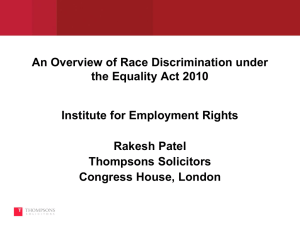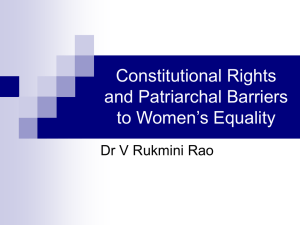LSIS Equality and Diversity training
advertisement
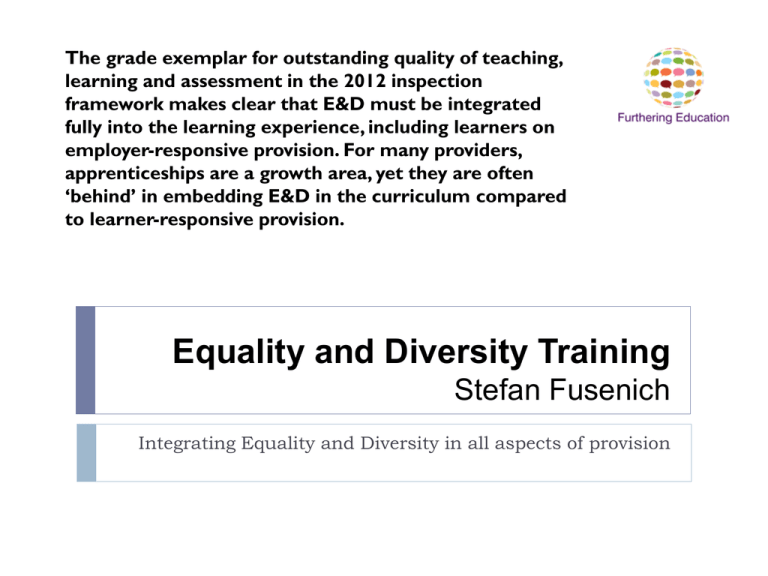
The grade exemplar for outstanding quality of teaching, learning and assessment in the 2012 inspection framework makes clear that E&D must be integrated fully into the learning experience, including learners on employer-responsive provision. For many providers, apprenticeships are a growth area, yet they are often ‘behind’ in embedding E&D in the curriculum compared to learner-responsive provision. Equality and Diversity Training Stefan Fusenich Integrating Equality and Diversity in all aspects of provision Aims and Objectives of the day To understand the importance of equality and diversity, how it fits within the Common Inspection Framework and how to embed within curriculum and the organisation overall Overall Objectives By the end of the event delegates will: Be able to explain equality and diversity and its importance Have explored what Grades 1-4 look like in relation to E & D and the Common Inspection Framework Know how to intergrate equality and diversity throughout DART Have reflected on how to promote E & D and tackle discrimination 1. 2. 3. 4. Activity 1 Defining what equality and diversity means? Equality and Diversity What is Equality? Everyone has equal human rights and therefore employment and services should be available to all. Equality is the framework that enables this opportunity. Everyone has individual needs and the right to have those needs respected. What is Diversity? You need to acknowledge that prejudice and stereotyping can be a part of everything we do and say. Diversity is the acknowledgement of this and that differences within and between groups of people should be respected. By recognising personal views, you can prevent discrimination happening both personally and by challenging others Group Questions Tutors:What does the Observer look for in relation to E&D? Managers: What do Ofsted look for in relation to E&D? Support Staff: What is the role of support staff in promoting E&D? Discussion Points How do you embed E&D in apprenticeship programmes when the learner spends most or all of their time in the place of employment? How do you avoid a ‘tick box approach’ to E&D for progress reviews or assessment visits? How can you genuinely and meaningfully raise awareness of E&D with learners and with employers? Equality and diversity as a concept and in practice means: actively promoting positive relationships and respect for human rights understanding and respecting differences taking positive actions to tackle unlawful and unfair discrimination, inequality and unfairness adopting practices that make best use of the differing skills and talents of individuals focusing on improving outcomes that raise standards and improve lives Key areas for thought The equality profile of your work force and learners The drivers of change The moral, legal and business cases for embracing equality and diversity The dangers of institutional discrimination. Effective ways of using learner profiles to promote and support equality and diversity During lesson observations how to evaluate E&D practice in teaching , learning and assessment 1. 2. 3. 4. Suggestions to teachers as to what an observer may look for embedded within a lesson: Ground rules very evident regarding students: Respect for others, i.e. equal opportunities to express own opinions; not talking when others are speaking; tolerance of others The language used and manner by which all communicate within the classroom is inclusive, appropriate and acceptable Time-keeping, i.e. punctual to lesson; late students do not disrupt the lesson when entering the classroom, etc. 5. Teacher is consistent and fair in the way all students are treated and given opportunity to participate 6. Resources used give opportunities to broaden the learner’s experience of: gender, age, race, culture, sexuality – avoiding stereotyping and prejudices 7. Teaching techniques, eg. Q&A, consider all learners equally and use a variety of assessment methods which ensure that all students are able to reflect on and review their learning 8. Student disabilities are accommodated so that all aspects of the lesson are inclusive and accessible and adaptive equipment is available 9. The teacher uses a wide range of examples and anecdotes which demonstrate a wide range of cultures, etc. and enable students to bring their life experiences to the classroom What is equality and diversity and what does it mean for me? It isn’t treating everyone the same! Why this is so important – Drivers for Change Remember you may not in your area be part of a particularly multi-cultural community, but you need to prepare learners for living and working in a multi-cultural community elsewhere – many of them will do. You need to translate these issues into how learners will deal with colleagues and customers in their future working lives with equally diverse backgrounds Activity 2 E&D WHAT YOU DO? What do you do at the moment for E&D make a list e.g Induction ground rules discuss discrimination and racism. Activity 3 What E&D issues do you face at your establishment? Homophobia? Racism?* Bullying*? Lack of understanding of others? Integration of students with learning difficulties? Identify what problems you think exist. There must be something…. *At chesterfield college we have a racism problem but this is not noticeable due to the low number of Black/ Asian students at the college. Bullying was seen by staff as not being an issue but after taking to student there seems to be a large number of problem in relation to bullying on facebook etc. What do Ofsted look at in terms of E&D When Ofsted refers to equality and diversity, it includes the equality strands used by the Equality and Human Rights Commission as well as social aspects such as poverty and deprivation. The 9 protected characteristics are: 1. age 2. disability 3. gender 4. faith and religious belief 5. race 6. sexual orientation 7. gender reassignment 8. pregnancy and maternity 9. civil partnerships and marriage Discrimination “One aspect of E&D is tackling discrimination” Activity 3 Look at the descriptions on your sheet what type of discrimination are they? Use the list below Type of discrimination Type of discrimination Direct Disablity Associative Harassment by third party Perception Vicitmisation Indirect Harassment Inspecting Equality Activity 4 Where is the data that signifies success drawn from? Why is E&D so important in the CIF? The areas of information Evidence contributing to the grade will be gathered when inspecting the five key outcomes for learners – enjoy and achieve, achieve economic and social well-being, feel safe, be healthy, make a positive contribution. Evidence will also be drawn from inspection of: Teaching and learning Meeting needs and interests of learners Partnerships, and their impact for learners Care, guidance and support Leadership and management The equality and diversity grade will contribute to and may limit the grade for overall effectiveness. The key question: The two operating principles for inspection of equality and diversity are: how effectively a provider is narrowing any achievement gap between groups of learners (EDIMS Data) how effectively a provider actively promotes equality and diversity and tackles discrimination The Effect of E&D on Inspection grades Where equality and diversity is inadequate: It is most unlikely that overall effectiveness will be better than satisfactory:- Overall effectiveness is likely to be inadequate Where equality and diversity is satisfactory: Most unlikely overall effectiveness will be better than good What do Grades 1- 4 look like? Activity 4 Activity 5 What makes an outstanding provider? What role does equality play in the workplace? i.e. just as health and safety in the workplace is identical to health and safety in the classroom (including proactive promotion) Equality and diversity is just the same in the classroom as it is in the workplace. Plus – this point in itself needs to be communicated to learners. They need to understand that their understanding of equality and diversity is absolutely essential if they are to be successful in their personal and professional lives. Moreover, this isn’t just about us and our students remaining within the law – it’s good for business! What have students done before? Learners will be coming to training providers prepared for equality and diversity discussion; it will have been part of their Personal, Social and Health Education (PSHE) curriculum since they were 4 or 5. Our challenge is to provide a seamless transition in their understanding. To enable this it is useful to have an understanding of what and how young people have been studying. What have students done before Key Stage Input Key Stage 1 (infants): There are different types of teasing and bullying; bullying is wrong; how to get help with bullying • Key Stage 2 (junior): Realise the nature and consequences of anti-social and aggressive behaviours, such as bullying and racism; recognise and challenge stereotypes • Key Stage 3 (11 to 14): The effects of all types of stereotyping, prejudice, bullying and racism; how to challenge them assertively • Key Stage 4 (14+): How to challenge offending behaviour, prejudice, bullying, racism and discrimination assertively and take the initiative in giving and receiving support Workshop 1 What are your problems with E&D what session do you struggle to fit E&D into. Activity 1 Give us some examples please use the post its and place them on the wall Activity 2 Collect 5 post-its in your group and identify what you feel they could do to embed E&D Workshop 2 Activity Embedding E&D in to lesson planning how to demonstrate it?? Please complete a lesson plan for your next session and identify how and where E&D can be embedded. Be prepared to share. Contact Details Stefan Fusenich Stefan.fusenich@furtheringeducation.org www.furtheringeducation.org Tel 07763220880




